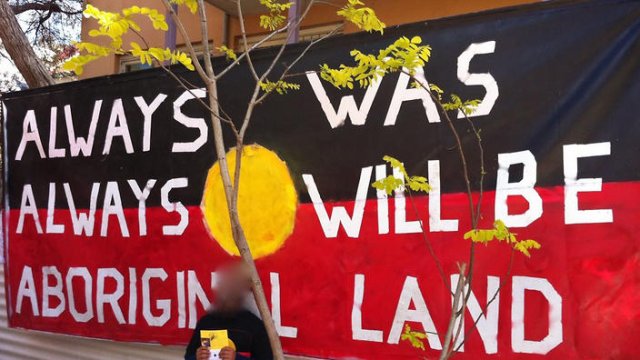
A packed audience listened as young Aboriginal women spoke about the rise of the Aboriginal rights movement and the struggle for Treaty at the Redfern Community Centre on March 22. Chaired by Jeff McMullen, the discussion was held as the federal government organises an Indigenous-led Referendum Council meeting to be held in Uluru in May.
Lynda-June Coe from Fighting in Solidarity Toward Treaties (FISTT) opened the forum by saying Treaty was the way forward and land rights were key.
She said: “Land rights are core to Aboriginal people’s existence. Land is our mother, our life-long connection to our planet. Make the land thrive is the philosophy of Aboriginal people.
“We have had significant grass roots meetings. In 2014 and 2015 there were two Freedom Summits held and a Treaty document was developed. The document said the Treaty was a path to unity, the right of each clan and family to unite the fire, that we have the right to life our culture, to skies, water.
Amelia Pangarte Kunoth-Monks, an Eastern Arrernte woman, travelled all the way from Utopia, a remote community in the Northern Territory, to address the forum.
She said treaty is more important than constitutional recognition. “We are still living on traditional settings on our homelands where time has no meaning. But we can sense the land is changing. Mother Earth is stirring and there is unfinished business with clan groups and with the government.”
Kunoth-Monks gave a passionate plea for unity. “We are the First Nations people of this country. And it is time to stand up. We haven’t had a chance to organise or discuss what we want to achieve: the government undermines our grass roots activity.
“To heal this country we need a change in consciousness in white people. I want white people empowered to teach their children about structures and history that oppresses people. They can’t keep being apathetic.”
On the subject of language, Kunoth-Munks said: As a person from tribal land where language is still constantly spoken, we need to ensure that our children are taught language. My sister and grandmother can speak it. My father retained his language.
“I love going home because I don’t have the internet. No phone. I don’t have to deal with Twitter and Facebook. I miss looking at the stars, going out to dirt and looking at the stars. That is my identity.”
Gunnai and Gunditjmara woman, Lidia Thorpe, spoke about the Treaty conversations being held in Victoria. “Warrior Aboriginal Resistance rallied 50,000 people in Melbourne, shutting down the city on Grand Final night. We have a heightened Aboriginal resistance now.
“No, we are not going to wait for a political party to feel sorry for us. We are demanding a Treaty. We don’t want to be friends with Turnbull and other political parties, we want rights in this country.
“We were part of the Victorian Interim Treaty group, but the government won’t fund us anymore. So we are going around talking to every clan and we will publish a booklet about Treaty and reparations. This is how we will empower people and unite. But we are being denied support. So it is up to elders and community to get to meetings and talk Treaty and Sovereignty and what it means.
“The Victorian government invited people from Canada and New Zealand to come and talk about Treaty. We were able to have real conversations with those people and learned they were not presenting the real story. From the Dakota Access Pipeline to injustices in the Maori community, there are many flaws with Treaties.”
Thorpe spoke about the need to rewrite the constitution. “The Constitution is a British construct. The Treaty is something we should write together, something we could all benefit from.”
Gamilraay woman Natalie Cromb said: ‘Democracy has been hijacked in this country. But we have done a lot of work on what a Treaty would look like.
“There needs to be much broader representation at the Treaty discussions the government are holding. We need each clan group represented. I agree with the concept of the Bill of Rights but I don’t think a Bill of Rights can take the place of a Treaty.
“We can learn from our brothers and sisters from across the ditch. We know they will violate the Treaty. We need to impose damages and injunctions against the government when they breach because we know they can’t be trusted.
“I am concerned about the resistance to Treaty but we don’t need to rush this. We need to take the time to consult with each different community and ensure everyone has their say and it is beneficial to all.”
The speakers agreed that gaining broad support was crucial and said they look forward to further Treaty discussions during the Indigenous-led Referendum Council meetings to be held in Uluru in May.
Like the article? Subscribe to Green Left now! You can also like us on Facebook and follow us on Twitter.